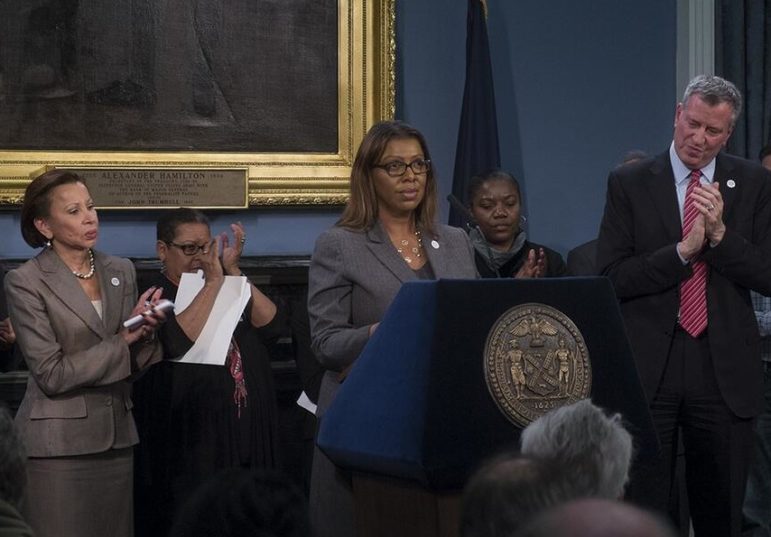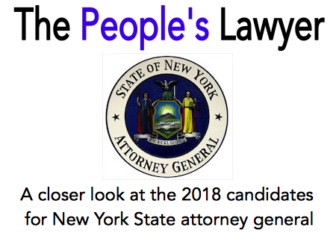
Mayoral Photography Office
Public Advocate Letitia James flanked by Rep. Nydia Velazquez and Mayor de Blasio at a 2014 press conference. She beat the odds to win her Council seat and PA post. Now a candidate for attorney general, the odds appears to be on her side--but they come with questions.
Before there was the run for attorney general, the win for public advocate and the break with the Working Families Party over the construction of Atlantic Yards project in Brooklyn, Letitia James was assistant attorney general for Brooklyn for then-Attorney General Eliot Spitzer and she was on the case of the FedEx dreadlocks.
It was June of 2000, and Christopher Polk, who had been working for FedEx for seven years in the company’s Flatbush office, had just been given an ultimatum — cut your dreadlocks or be demoted. For FedEx, Polk’s dreadlocks did not comport with the company’s policy that male employees in “public-facing” positions refrain from wearing “beards, ponytails, braids or earrings of any kind.” For Mr. Polk, whose move to Brooklyn from Indiana had sparked a spiritual and cultural exploration of his Afro-Caribbean roots, the request to cut his hair was antithetical to his Rastafarian faith.
After a long deliberation, Polk’s managers gave him a choice: Cut the dreadlocks or be demoted. The same day Polk received his final warning, the FedEx courier ran into James in Downtown Brooklyn and the whole story came out. “She said, ‘They can’t do that. I want you to come and talk to me’,” Polk recalls. By the time James contacted her colleagues in the civil rights bureau in Manhattan, she had seven FedEx employees who had all been terminated or threatened with termination because they refused to cut their dreadlocks.
The civil rights bureau filed an Equal Employment Opportunity Commission complaint against FedEx in 2001, and when the company didn’t budge, Spitzer filed suit in federal court in Brooklyn, alleging that the plaintiffs had been discriminated against because of their “sincere religious belief,” a violation of Title VII of the 1964 Civil Rights Act. In 2006, Spitzer and FedEx settled the lawsuit, with FedEx agreeing to a state monitor for two years. The terminated employees came to a separate settlement with FedEx, the details of which are confidential. Polk, who has since adopted the first name “Eternal,” credits James’perseverance with helping the fired employees, all African-American men, create a credible case, one that propelled both the lawsuit as well as the legal settlement with FedEx. “FedEx was never going to come to the table with anything. Their goal was to wait us out.” The fact that the workers were able to organize, file for a settlement and reach a deal—”that was all because of Tish,” says Polk.
In the interim, James had moved on, running and losing a 2001 primary bid against then-City Councilman James Davis, only to win the seat on the Working Families Party line in a 2003 special election after Davis was assassinated. She represented the Brooklyn district—the 35th, including Fort Greene, Clinton Hill, Downtown Brooklyn, Prospect Heights and Crown Heights—through 2013, before winning citywide election as public advocate.
Now James is the putative front-runner and establishment pick in this year’s four-way Democratic race for attorney general, which will end with the primary election on Thursday, September 13. Equipped with top-drawer endorsements and a large war chest, she faces questions about her independence from the governor and the support she has drawn from the real-estate industry.
Controversy is not new territory for James. From navigating sensitive cases as an assistant attorney general to taking the Bloomberg administration to task to inserting the office of public advocate into nearly a dozen lawsuits, she has notched successes, overcome doubts, and faced questions.
A role in scrutinizing stop-and-frisk
While the majority of the work in the attorney general’s office is defensive, involving representing the state, its agencies and its employees against lawsuits, the role of the assistant attorney general in Brooklyn is largely affirmative, finding and initiating lawsuits on behalf of constituents.
James “did what many regional office chiefs in those days did, which was, she would identify issues in the community that she was serving, and she would float them to us in the bureau as important and of concern,” recalls Andrew Celli, then head of the civil rights bureau and now an attorney in private practice. Celli says James often brought issues before the civil rights bureau. Many were tossed: either there weren’t enough lawyers to work on the issue or it didn’t fit the guidelines the office had developed to pursue lawsuits. But in three noteworthy instances, Celli remembers James’contributions as critical—finding the plaintiffs in the FedEx case, working with victims of predatory lending practices (mortgage brokers targeting low-income Hispanic and African American homeowner applicants and charging higher fees than white applicants) and finding victims of the massive stop-and-frisk lawsuit the civil rights bureau pursued after the police shooting of African-American immigrant Amadou Diallo in the Bronx in 1999.
In the wake of the shooting—a four-man Street Crimes Unit shot the terrified street vendor 19 times, its members claiming in a later trial that they thought Diallo was going for a gun when he reached for his wallet—the bureau analyzed 175,000 stop-and-frisk encounters over a period of 15 months to establish if there was a racial bias and pattern. “Tish was very involved in helping us design the research report and organizing and conducting the meetings. We got the data from the NYPD but we did not have the narrative stories to illustrate the impact of a bad stop-and-frisk encounter,” recalls Celli. “It was very important to marry the data with the narrative” and James was instrumental in that. “The stop-and-frisk report was probably the biggest thing the civil rights bureau did,” says Celli. As for the predatory lending case against Delta mortgage lenders, “that was a case that came out of our bureau, not from Tish,” says Celli, but “she was savvy at finding stories and narratives that makes the cases stick.”
In an interview last week, James picked up the theme of real-estate finance, telling City Limits that if elected attorney general, she wanted to investigate a raft of Trump family holdings, including the Trump golf course in the Bronx, Trump Hotel on Fifth Avenue—teetering on bankruptcy until a flood of foreign cash righted the building— as well as the purchase of a Brooklyn property by Trump son-in-law Jared Kushner, and the alleged harassment of tenants in the building. James calls herself “particularly fascinated” by the golf course in the Bronx. “I just want to know if there were any commitments with the City of New York associated with the golf course and whether he’s complying with those commitments.”
Upset victory and a watchdog role
James’ nose for substantive and headline-friendly controversy was also reflected in her years on the City Council. In 2009, as chair of the Committee on Contracts, she began holding hearings on the CityTime scandal — the massive timekeeping and payroll system update that began in 1998 under a contract for $63 million only to balloon to $700 million when it finally came to a halt under the Bloomberg Administration in 2011.
The Bloomberg Administration eventually successfully recouped $525 million from Science Applications International Corporation, but the episode was an enormous black eye for the businessman mayor — with former Administration employees questioned over conflicts of interest and failure to reign in the fraud — and the husband and wife team of the largest subcontractor, TechnoDyne, shuttering their doors and fleeing to India ahead of arrest.
James says it was her hard work and others’that won the money’s return to the city, and that Bloomberg would not have pushed for it, if she and others hadn’t led the charge: “I remember bringing CityTime to his attention,” after the Daily News broke the story and then-City Comptroller John Liu started his investigation. “I can recall [Bloomberg] saying, and this is his quote, ‘It’s complicated, Tish’.” James says she paid the price for her tenacity, being reassigned in 2011 from chair of the Committee on Contracts to chair of the Sanitation Committee. Political payback delivered via Council Speaker Christine Quinn? “No comment,” says James. If James made enemies, it also could have been thanks to her energetic opposition to the Atlantic Yards real-estate scheme. And when Bloomberg and Quinn moved to extend term limits in 2008, James and Council colleague Bill de Blasio led the opposition.
Looking back on her time on the Council, James is happy to speak about the 2007 Safe Housing Act she co-sponsored with Quinn, under which, every year the city would identify 200 buildings with the most housing code violations and target them for aggressive inspection, follow-up and comprehensive repairs, as well as legislation to force the administration to come to the City Council when big projects, like CityTime, run over budget.
James faced primary challengers during both her Council re-election campaigns, but bested them and her general-election opponents. In 2013, despite raising significantly less than two of her rivals, she won a five-way primary for public advocate, dominated a runoff against Daniel Squadron and was easily elected in the general to become the first woman of color to hold citywide office in New York.
As public advocate, James maintains her office has settled more than 30,000 complaints, introduced 48 pieces of legislation in the City Council—”10 of which are now law”— and has won more lawsuits than any other public advocate. Those two wins have been modest: pushing the city Department of Education to open up its formerly secretive school leadership team meetings and more heating for tenants in freezing NYCHA housing. There are nine others that James filed that were not successful, with courts finding her office had no legal standing to sue.
James faced harsh criticism after bringing 12-year-old Dasani Coates onto the stage at City Hall during her swearing in as public advocate on January 1, 2014. Referring to Dasani, a homeless child profiled in a New York Times series, as “my new BFF,” James directly and indirectly criticized the outgoing Bloomberg Administration, at one point calling for an administration “that cares more about a child going hungry than a new stadium or a new tax credit for luxury development.” The Times called James’ speech “the worst” among the raft of speeches that day the paper called “graceless and smug,” and decried the public advocate’s decision to have the child on stage with her as “a prop.”
Ready for the next stage?
The question now for James, a 59-year-old African American woman who was born and raised in Brooklyn and still lives there, is, can she handle the demands of the Attorney General’s office—with seven departments, 1,000 lawyers and over 25,000 active cases at any one time. James has the confidence to try and waves away criticism that she needs to pick her battles.
During the Aug. 29 attorney general primary date televised on NY1, she stressed the importance of working with other elected officials to achieve reform. James in fact has a deep history of working in Albany, from her early days working as staff counsel for with former Assemblyman Al Vann; as chief of staff to former Assemblyman Roger Green; helping the State Assembly Black and Hispanic Caucus write new healthcare legislation and serving on a gubernatorial task force on diversity in the judiciary.
James claims her Achilles’heel has been her ability to raise money, and in earlier races, her fundraising did lag behind others’. This year, she has raised nearly $1.6 million so far, according to state Board of Elections records. More than $200,000 of that total came from limited liability companies, which enjoy a controversial loophole in election law that permits massive campaign spending by businesses. She also has logged $15,000 from the political action committee of the Real Estate Board of New York, which lobbies for developers’interests.
Those donations have generated static but the chief criticism James has faced has been her close association with Gov. Andrew Cuomo, who has endorsed her and raised money for her. With the September 13 primary nearing, James has grown increasingly short with questions about her perceived closeness with the governor, and nearly snappish in her answers—her independence “has never been questioned until now and I will not allow anyone to question it,” says James, who says she considers herself as an outsider, “just by my nature.”
As for The New York Times’endorsement of Zephyr Teachout, the Fordham law school professor and one of James’three rivals in the Democratic primary for attorney general, James’points to her endorsement by 95 percent of the unions of New York State, as well as Emily’s List, a national political action committee that works to elected pro-choice female Democrats. “I’ve paved my own path and scratched and clawed my way to the inside, and still consider myself an outsider.
Adds James: “I have been consistently underestimated, but I have repeatedly overperformed. And I’m usually at my best when I’m up against the wall. Which is why I have a particular affinity for the underdog.”










